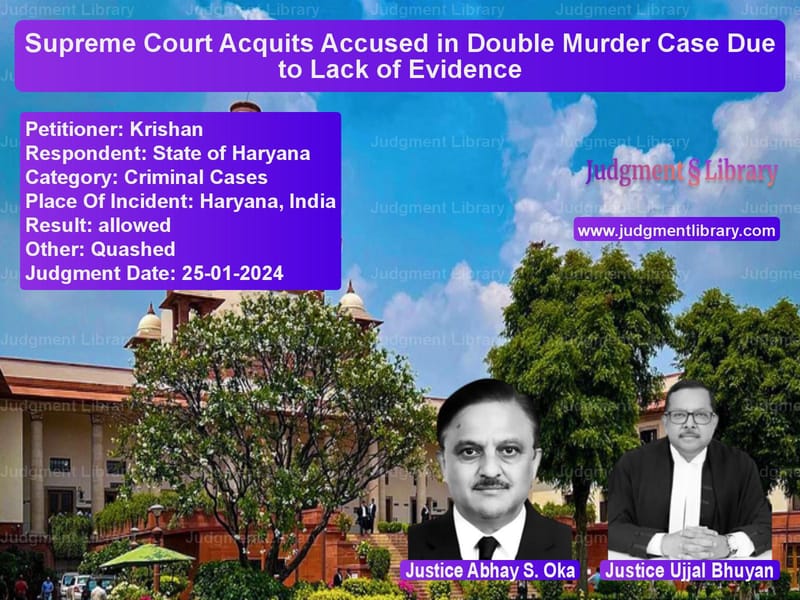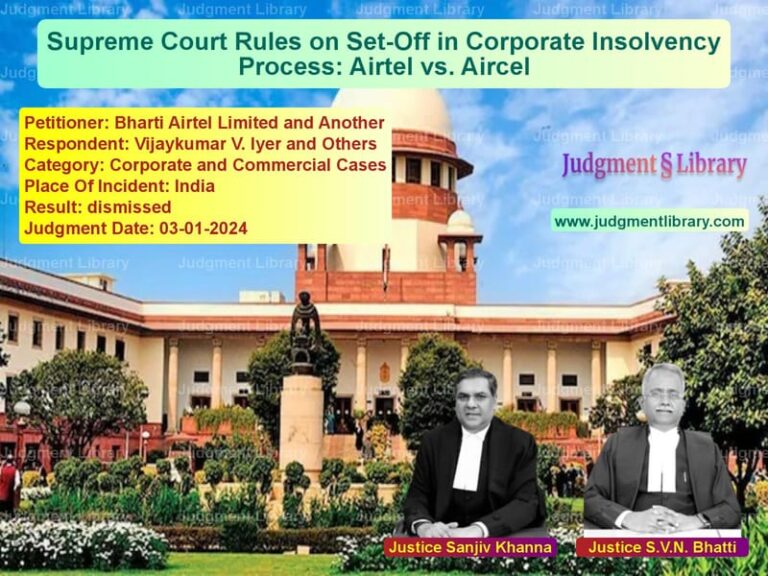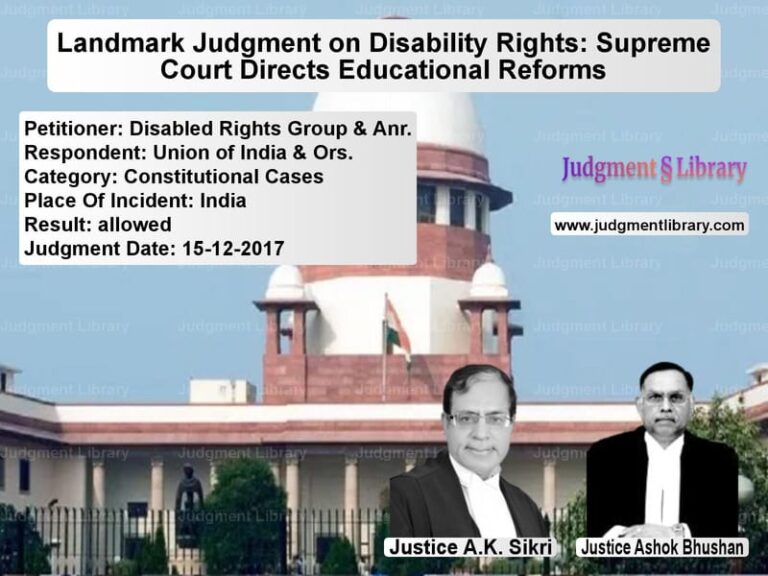Supreme Court Acquits Accused in Double Murder Case Due to Lack of Evidence
The Supreme Court of India has acquitted Krishan, the appellant in a double murder case, ruling that the prosecution failed to establish guilt beyond a reasonable doubt. The decision overturns the conviction upheld by the Punjab and Haryana High Court and the Additional Sessions Court, Gurgaon, in connection with the murders of Pawan and Ajju Chaudhary. The judgment highlights crucial lapses in the prosecution’s case, including unreliable witness testimony, weak forensic evidence, and lack of proper investigation into alternative suspects.
Background of the Case
The case involved the murders of Pawan and Ajju Chaudhary, which occurred between the night of January 4, 2004, and the morning of January 5, 2004. The prosecution alleged that Krishan (appellant) and Mahesh (co-accused) were responsible for the crime. According to the prosecution, Pawan had a criminal history and was involved in cases of dacoity and theft. His brother, Dharmender (PW-2), received information about Pawan’s death on January 5, 2004, and informed the police. The police later recovered the bodies of Pawan and Ajju Chaudhary.
Read also: https://judgmentlibrary.com/supreme-court-acquits-murder-convict-due-to-lack-of-conclusive-evidence/
The prosecution relied heavily on the statements of alleged eyewitnesses, Mukesh (PW-1) and Vijender (PW-3), along with the recovery of a weapon reportedly linked to the crime.
Key Issues in the Case
- Whether the eyewitness testimonies were credible and reliable.
- Whether the weapon allegedly recovered at the appellant’s instance was conclusively linked to the crime.
- Whether an alternative suspect, Naresh Yadav, was adequately investigated.
Arguments of the Appellant (Krishan)
The defense, led by amicus curiae Gaurav Agrawal, made the following submissions:
- The case relied on eyewitness testimony from PW-1 and PW-3, but both were declared hostile and did not support the prosecution’s version.
- The recovery of the weapon allegedly used in the crime was unreliable as it was found in an open area accessible to all.
- The forensic report did not conclusively establish that the recovered bullets were fired from the recovered weapon.
- The prosecution failed to investigate the role of Naresh Yadav, whom the victim’s family suspected of involvement in the murder.
- The police did not follow proper procedures in securing independent witnesses for the weapon recovery.
Arguments of the Respondent (State of Haryana)
The prosecution, represented by Bina Madhavan, countered these claims:
- The recovery of the weapon was lawful and should be admitted as evidence.
- The forensic expert’s report established that the bullets found in the deceased’s body could have been fired from the recovered country-made pistol.
- The non-cooperation of eyewitnesses should not weaken the prosecution’s case if other evidence supports guilt.
- The accused’s disclosure led the police to the place where the bodies were dumped, confirming his involvement.
Supreme Court’s Analysis
The Supreme Court scrutinized the prosecution’s evidence and found multiple inconsistencies:
1. Unreliable Eyewitness Testimonies
Both PW-1 and PW-3, alleged eyewitnesses, did not support the prosecution’s case in court. Without credible eyewitness accounts, the prosecution’s claim that the appellant was seen committing the crime was unsubstantiated.
2. Weak Forensic Evidence
The Supreme Court noted that the prosecution failed to establish a direct link between the recovered weapon and the bullets found in the deceased’s bodies. The forensic report only suggested that the bullets “could have been” fired from the weapon, but this was not conclusive proof.
3. Suspicious Weapon Recovery
The Court found the circumstances of the weapon’s recovery dubious:
- The recovery was made more than a month after the murder.
- The weapon was found in an open public space, making it accessible to others.
- No independent witnesses were present during the recovery.
Given these factors, the Court ruled that the weapon’s recovery could not be relied upon as decisive evidence.
4. Failure to Investigate Alternative Suspect
Dharmender (PW-2), the victim’s brother, had initially suspected Naresh Yadav, citing past enmity. However, the police did not adequately investigate Yadav’s role. The Supreme Court found this failure significant and criticized the prosecution for not exploring all possible leads.
5. Disclosure of Dead Body Location
The prosecution claimed that the appellant disclosed the location of the bodies during interrogation. However, the Court observed that the police had already recovered the bodies before the alleged disclosure, making this claim irrelevant under Section 27 of the Indian Evidence Act.
Final Judgment
In light of these findings, the Supreme Court held:
“The prosecution has failed to establish its case beyond a reasonable doubt. With both eyewitnesses turning hostile, weak forensic links, and an unconvincing weapon recovery, the benefit of the doubt must be extended to the accused.”
The Court quashed the High Court’s and Sessions Court’s judgments, acquitting Krishan of all charges. It ordered his immediate release unless required in connection with any other case.
Key Takeaways
- Eyewitness credibility is crucial: If key witnesses do not support the prosecution’s case, it weakens the overall argument.
- Forensic evidence must be conclusive: Mere possibility is insufficient to convict an accused.
- Weapon recovery must be from a secure location: Finding a weapon in a public place without independent witnesses is unreliable.
- Proper investigation of alternative suspects: Failure to probe other leads can weaken a case.
- Section 27 disclosures must be relevant: If police already know information, later disclosures by an accused hold little legal value.
Conclusion
The Supreme Court’s ruling in Krishan v. State of Haryana highlights the importance of thorough investigation, credible witness testimony, and reliable forensic evidence in criminal cases. The judgment ensures that individuals are not wrongfully convicted based on weak circumstantial evidence. By acquitting the appellant, the Court reaffirmed the fundamental principle of criminal law that an accused must be proven guilty beyond a reasonable doubt.
Petitioner Name: Krishan.Respondent Name: State of Haryana.Judgment By: Justice Abhay S. Oka, Justice Ujjal Bhuyan.Place Of Incident: Haryana, India.Judgment Date: 25-01-2024.
Don’t miss out on the full details! Download the complete judgment in PDF format below and gain valuable insights instantly!
Download Judgment: krishan-vs-state-of-haryana-supreme-court-of-india-judgment-dated-25-01-2024.pdf
Directly Download Judgment: Directly download this Judgment
See all petitions in Murder Cases
See all petitions in Bail and Anticipatory Bail
See all petitions in Custodial Deaths and Police Misconduct
See all petitions in Judgment by Abhay S. Oka
See all petitions in Judgment by Ujjal Bhuyan
See all petitions in allowed
See all petitions in Quashed
See all petitions in supreme court of India judgments January 2024
See all petitions in 2024 judgments
See all posts in Criminal Cases Category
See all allowed petitions in Criminal Cases Category
See all Dismissed petitions in Criminal Cases Category
See all partially allowed petitions in Criminal Cases Category







